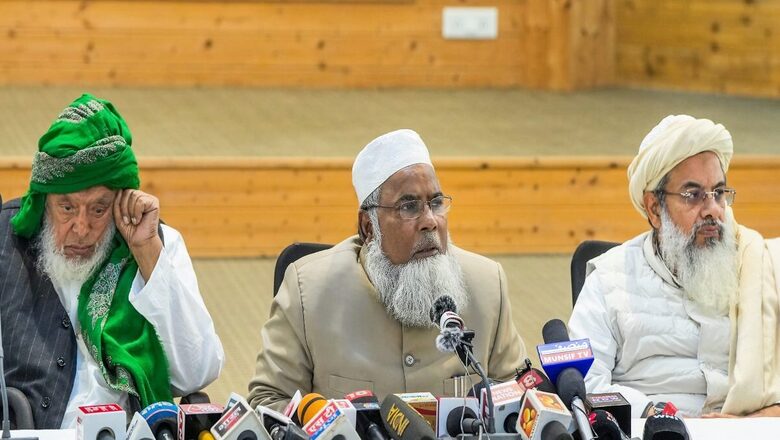
views
Days after Prime Minister Narendra Modi pitched for a ”secular civil code”, the All India Muslim Personal Law Board on Saturday underlined the Law Commission’s 2018 assertion that a uniform civil code is neither necessary nor desirable and asserted that any attempt to bring it would be ”unacceptable”.
The All India Muslim Personal Law Board (AIMPLB) said it considers the prime minister’s call for a secular civil code and terming religious personal laws as communal ones ”highly objectionable”.
The AIMPLB said in no uncertain terms makes it clear that it is “unacceptable” to the Muslims as they will never compromise with the Muslim Personal Law.
AIMPLB spokesperson S Q R Ilyas expressed shock at the prime minister’s remarks to bring in a secular civil code.
He called it a ”well thought out conspiracy that will have grave ramifications”.
The Board considers it important to mention that the Muslims of India have made it clear many times that their family laws are based on the Sharia law, which no Muslim can deviate from, at any cost, the statement said.
The legislature of the country itself has approved the Shariat Application Act, 1937, and the Constitution of India has declared it a fundamental right under Article 25 to profess, propagate and practice religion, it said.
The family laws of other communities are also based on their own religious and ancient traditions and tampering with them is basically a negation of religion and an imitation of the West, Ilyas said.
He said such absolute powers should not be exercised by the elected representatives of the country.
Ilyas said the uniform civil code mentioned in the Directive Principles is a mere direction and all the directives are neither mandatory nor enforceable in courts.
These Directive Principles cannot supersede the fundamental rights enshrined in the Constitution, Ilyas said.
He reaffirmed that the Constitution envisages a federalist political structure and a pluralistic society, where religious sects and cultural units have the right to practice their religion and maintain their culture.
Ilyas criticised the prime minister’s use of secular civil code instead of the constitutional word uniform civil code, claiming that it was ”misleading” Uniform means it will be applicable to the whole country and to all religious and non-religious people.
There will be no room in it to exclude any class or caste or even tribals, he said.
Ilyas questioned the prime minister’s intention, alleging that he was ”targeting” only the Sharia law.
”laws based on religions communal, the prime minister has not only imitated the West, but has also insulted the majority of the country who practice religion. This doesn’t augur well with religious groups,” he said.
Ilyas said the Board also wants to make it clear that for those who want to live their family life free from any religious restrictions there is already Special Marriage Act 1954 and The Indian Succession Act 1925.
He said any attempt to bring a secular code by changing the Shariat Application Act and Hindu laws will be ”condemnable and unacceptable”.
Ilyas asserted that the government should uphold the observation made by the BJP government-appointed Chairman of Law Commission, who had categorically stated in 2018 that a uniform civil code is ”neither necessary nor desirable”.
Ilyas exhorted the citizens to remember the sacrifices and achievements of our freedom fighters and the dream of a free, prosperous, fair and peaceful India, and not get polarised by the religious hatred and animosity being created in the society.
The Board said it hopes that peace-loving and just citizens of the country will reject this subversive and anarchic act in complete solidarity.
Modi had said in his Independence Day address that a ”secular civil code” is the need of the hour for the country. He also described the existing set of laws as a ”communal civil code” and termed them discriminatory.
Modi said in his Independence Day address, ”A large section of the country believes, which is true also, that the civil code is actually in a way a communal civil code. It discriminates (among people).” The prime minister had said the laws which divide the country on communal lines and become a reason for inequality have no place in a modern society.
”I would say, it is the need of the hour that India has a secular civil code. We have lived 75 years with a communal civil code. Now, we have to move towards a secular civil code. Only then would religion-based discrimination end,” he said.



















Comments
0 comment